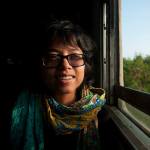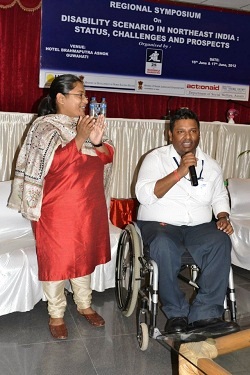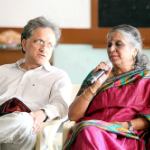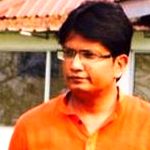Our (Northeast India's) relationship with our neighbor Burma has been of a long term. Long enough to have featured in our pre-class VIII history book (I have not read any history after that). Post India's independence though the relationship has turned into that of a long distance kind. You imagine what your partner is doing but you never get to see each other. Sometimes you meet, but there is never time to share much. Gradually you become strangers.
Before India happened to the Northeast, it shared marriage, trade, war and the British with Burma. After India it shared border policing, militant training, drugs and nefarious business relationships. A place which has been culturally close has become an inhospitable blur to the people. Visiting Burma therefore raised a uncanny feeling inside. As if I am going to meet a person from a family with which my family has a feud.
The pre-exposures to the real rendezvous had not been very innocent either.
The first time through Moreh in Imphal and some well connected friends, a bunch of us had managed to sneak into Burmese territory some 40 km after the Burmese border town of Tamo. Officially you are not allowed to go any further than Tamo. Someone also managed to sneak in a camera. The euphoric feeling of cheating the whole nation-state concept turned quite tense once we were stopped at a Burmese army check post. Luckily we were turned back. They did not want us. Dead or alive.
My second close encounter with my first-cousins-forcibly-removed-by-modern-nation-state-boundaries was in Mae Sot, Thailand. This tiny border town in Thailand hosts more than 350,000 Burmese immigrants. Some of them internationally recognised refugees, all of them cheap labour for Thailand. Fleeing from the violent internal conflict in Burma, hundreds of thousands of Burmese people cross the Thai border everyday in search of safety and livelihood. The Burmese side of the land, I hear is treacherous. There is a war launched by Myanmar army on the people. The jungles are full of mines laid by the Junta army. There is no amenities, no security. On the other side of the border, the Thai government has refused to recognize Burmese people as refugees. In addition they have declared the area around Mae Sot town a special economic zone, giving policy incentives to Thai people to set up factories in the area. Incentive to use the cheap Burmese labour who are not recognised legally and hence have no labour rights.
All this and an unhealthy amount of love for AungSan Su Kyi created a kinky image in my head when I decided to take Burma from Bangkok. Logically speaking it would have made more travel sense if I entered Burma straight from my backyard in my pajamas. Or I could come back home from Bangkok via Mandalay visiting some aunt on the way and saving much money and time. But the world has not been made for travelers. Otherwise they would remove all boundaries.
As we drive out of the Airport to my not so cheap backpackers place the driver asks me, 'Are you a Muslim?' Now that's a first one for me. I have been asked if I am Thai, Lao, Philipino, Nepalese but not if I am a Muslim. I tell him no and ask him why he asks me. He says, because there are many Muslims in Burma and the place where I am going has many Muslims around. I see!!
The driver speaks impeccable English (he lived in London) and is talkative. He wants to know why I am staying in such a cheap place.
"30 dollars is not cheap!" I exclaim.
"Burma is expensive." He agrees and tells me when the by elections took place (few weeks ago) a lot of people suddenly arrived. All the hotels were full. So the owners raised their rates. People still paid (they earn dollars and euros). And the owners thought that they could do this forever. So they have not reduced the rate. Also, he informs me. Burmese government has been advised not to promote cheap tourism. He continues, "A guy I was driving around in Yangon, he came for advising the government on tourism. He told me we should not aim for the cheap tourist. They are dirty and they leave the country nothing. They save all their money and send it home and here they want everything cheap." The weather report has been saying Myanmar is changing. It is opening up. And how!
The Myanmarese government's exclusive stance is known to the world. Not really. There is hardly anything that the world knows about Myanmar. Apart from Aung San Su Kyi, Myanmar has managed to do things so secretively that even us nosey neighbours know hardly anything about it. The government has been typically oppressive military one. There have been wars going on with people inside within its own territory. There have been economic sanctions. How many know about the Karens or the Nagas or the Chins or the Rohingyas in Myanmar or how many of them have died? Not many, my guess-work-science intuition tells me.
So Muslims in Myanmar were a bit of a surprise. When I went out for my first meal I found a food joint right next door. They had laid their small plastic tables and stools on the street and a spread of food that looked darker than any food in Thailand. I ate the Mutton, the Beef and some fish. I was served dry fish chutney on the side by a Muslim man I know because he had beard and the Muslim skull cap. The place is run by his family. One daughter, two sons and wife. They rice tasted like biryani, the mutton quite north Indian, the dal like sambhar, the dry fish like Manipuri, the Beef like korma and the fish like Bengali. I was taken aback. The first meal between a taxi ride from airport and the first night's sleep in a congested yet super friendly place gave me the taste of Yangon. I never expected Burma to be such a mix. I thought all Burmese wear checkered lungis. And they do. Only there are different Burmese.
My obviously foreign presence in the local eatery obviously arouses curiosity. The Muslim owner comes to chat up.
Where you from?
From Assam
Assam?
India, bordering you, Assam, Manipur, Nagaland?
Oh Aten! We call it Aten. You from Digboy?
Well, close by.
My turn for questions come:
Where are you from?
India, Tamil Nadu. Have you heard? My grand father's father was Tamil.
Since when have you been in Burma? Since from beginning. My father's grand father came first. He came from Chennai. You know Chennai?
Yes, I do. Why did he come? (Sometimes in retrospect you know what strange things you say. How will he know what his grandfather did?)
He came to do business. Now my whole family is here and we are Burmese. I have never been to India.
Yangon surprisingly turned out to be a very mixed culture. For thousands of years, Burma has been receiving visitors from China, Persia, India, Nepal, Bangladesh, South East Asia and Britain. The assimilation is evident when you walk around downtown Yangon's Sule Pagoda. In the centre of Yangon is Sule Pagoda, surrounded by a mosque with a sign in Bangla that says Bangali Sunni Jamme Masjid. On the other side of the Pagoda is the Emmanuel Baptist Church. All around Yangon, you see Pagoda's, Churches, Mosques and Temple. Everyone (whether tall and dark or fair and petite) wears the same national dress of a checkered wrap around and shirt for men and printed or woven wrap skirts and blouses for women. The food which I described before has taken from all its visitors. Colonisation too left its mark with the obviously Bristish buildings which reminded me of Kolkata all the time.
Sadly, post General Aung San, Myanmarese politics has not retained this assimilation in its political agenda. The military Junta has been following a policy of insider-outsider with extreme violence. The army has been running genocide like campaign on many of its ethnic communities. Muslims in Burma too have been facing prosecution for a long time.
Muslims in Burma, according to history, arrived as early as the 9th century from Parsia. They have been coming in as traders, settlers, military personals, prisoners of war and refugees from the neighbouring Bangladesh ever since. Today, the minority population of Muslims faces systemic discriminations like exclusion from government jobs, breaking down of Muslim schools, refusal of birth certificate to Muslim babies, refusal of identity and other documents to Muslims and even a refusal to recognize them as citizens of Myanmar.
Perhaps the most badly caught in this mess are the Rohingya Muslims who do not belong to any country! The first arrivals from a shipwreck in 9th century the Rohingya Muslims have been living in Rakhine state since. Apart from trade and marriage with local communities, they also occupied position's in many king's courts. When the Junta came into power in 1978, they launched an operation against the Rohingyas to drive them away from Burma. Hundreds of thousands of Rohnigyas fled to Bangladesh looking for safety. Bangladesh however refused to accommodate them and said they belong to Burma.
Ever since the Rohingyas have been existing in this planet, divided according to the boundaries of the nation-state, without any state to claim them as its own. Most Rohingyas work as fishermen, living on boats in the rivers and the Bay of Bengal. Their love and relationships happen on boats; their children are born in boats, many breathe their last on the boats. Many try to 'illegally' enter countries like Australia and Malaysia. Most often they get caught and are sent back or they die in their airless containers. No one wants them!
It is a sad story of not just a community or a country but of the entire state of the world. We live in a planet big enough to accommodate not just all human beings but also the animals, the plants, the seas and the mountains. Today humans talk about setting up colonies in Mars and the moon. There are people on this earth who own thousand of acres of land, whole islands and mountains. Yet we have this group of people who the whole world refuges to call their own. Governments all across the globe talk about strengthening their nation, talk about development, talk about relationships between states. Can we talk about some radical rearrangement of the world where no one will be stateless and every human being will have some soil to rest their souls? So close to some 'great nations' like India, China, Thailand, Malaysia, Australia, Bangladesh - isn't it a shame that thousands of children are being born stateless?
More from our neighbour...







































